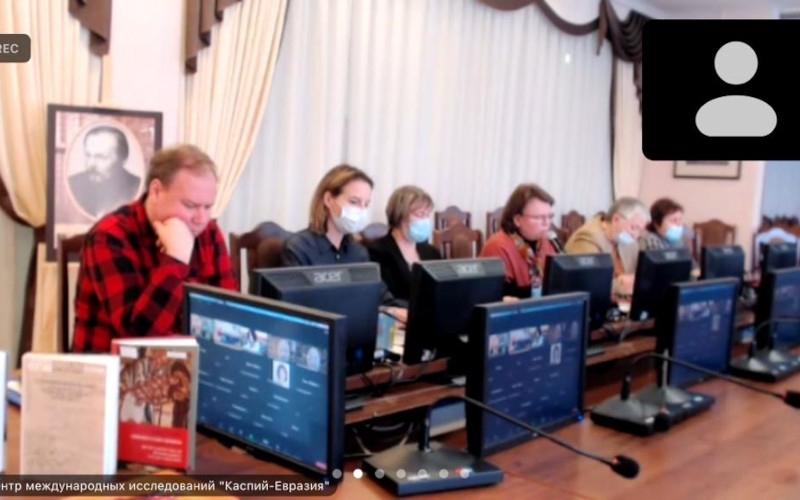
On February 17, the International Project "Eternal Dostoevsky" started in Astrakhan.
Students, teachers and representatives of Russian Houses and Centers of the Russian language and culture from the CIS countries and far abroad showed interest in a series of events dedicated to the 200th anniversary of the birth of the great writer: Azerbaijan, Bulgaria, Hungary, Germany, Greece, Kazakhstan, Moldova, Poland, Slovakia, Turkmenistan and Uzbekistan, as well as the regions of the Russian Federation.
The authors and organizers of the project are the partner of the Eurasian Peoples' Assembly. They are the Center for International Studies "Caspian-Eurasia", Astrakhan State Technical University, Astrakhan Regional Scientific Library after N.K. Krupskaya. The project is supported by the Government of the Astrakhan Region, the Agency for Youth Affairs of the Astrakhan Region, the Center for Supporting the NGOs Activities and Civil Initiatives of the Astrakhan Region and the Presidential Grants Foundation.
Russian language and culture through the Dostoevsky’s texts
On February 17, the first event of the series - the online Lecture Hall "Dostoevsky in the 21st century: we read, we study, we think" took place. The meeting was addressed to teachers of literature and Russian as a foreign language in the CIS countries and far abroad, as well as compatriots living abroad.
The head of the Caspian-Eurasia Center Ksenia Tyurenkova noted that the goal of the Eternal Dostoevsky grant project is to preserve the linguistic and cultural environment in the Russian-speaking space in the CIS countries and far abroad.
“The project will create a single social and cultural space within an international educational platform for students, high school students and teachers. In addition, Eternal Dostoevsky will contribute to the development and strengthening of international cooperation,” - the organizers say.
One of the speakers of the first online lecture was a literary critic, critic, Doctor of Philology and Head of the Literary Theory Department of the Institute of Literature of the Russian Academy of Sciences, Chairman of the Commission for the Study of Creative Heritage F.M. Dostoevsky Scientific Council "History of World Culture" RAS Tatyana Kasatkina. The report of the expert was devoted to the analysis of the novel "Crime and Punishment" from the point of view of the gospel plot and the Christian principle in the work. Tatyana Alexandrovna gave an interpretation of the most complex texts of Dostoevsky, revealing biblical allusions in them.
According to the moderator of the event, Associate Professor of the Russian Language Department of the Astrakhan State Technical University Dmitry Bychkov, such a look at the work of the great writer enriches the reader's understanding of his works, especially, when it comes to teaching Dostoevsky's texts among foreign students.
“The task of studying Dostoevsky's texts in the lessons of Russian as a foreign language is one of the most difficult,” - Bychkov emphasized.
Great classic and "Russian brand"
A modern approach to interpreting and studying the texts of Fedor Mikhailovich was presented by Olga Kryakhtunova, Associate Professor of the Department of the Russian Language of the Astrakhan State Technical University. The expert has extensive experience in teaching Russian language and literature to foreign students. In her opinion, those who are impressed by the image of Russia in Dostoevsky's novels are often embarrassed to give answers about how they understand Russia and Russian culture.
“Many foreigners bring the events in Dostoevsky's stories into our lives,” - emphasized Kryakhtunova.
However, there is another view of the work of the great writer - more ironic. For example, issues of Turkish bloggers are dedicated to Dostoevsky's works. There are foreign psychologists who cite plots from the writer's novels as an example of their cases. There are even emojis on the theme of "Crime and Punishment", as well as comics and a collection of recipes from Dostoevsky.
According to some listeners, modern forms of presentation of the text, for example, the same comics, can incorrectly teach Russian culture to foreigners. However, experts assured that comics are only the first step in studying the writer's world. They are more likely to interest the younger generation and encourage them to read his novels in their entirety.
“Dostoevsky has become a kind of brand that can attract the attention of foreigners. His image is widely used in the marketing space,” - Olga Kryakhtunova summed up, adding that, after all, Dostoevsky’s work is directed towards cultural dialogue and his novels are above time and space.
Dmitry Bychkov's report was devoted to mysticism in the work of the great classic. As the expert noted, Dostoevsky introduced the genre of mystical realism into Russian literature. Bychkov advised his colleagues to read and reread the writer's texts, discovering new allusions and interpretations.
"Eternal Dostoevsky" opens up new horizons for teachers
The first event within the project received a great response from teachers of Russian language and literature abroad.
“The phenomenon of Dostoevsky lies in the fact that he tells about human destinies without embellishment. So many years have passed since he passed away, and the writer's works are still relevant today. The project "Eternal Dostoevsky" opens up great opportunities for me to further study the work of a brilliant writer. Thank you for this opportunity,” - says Kurmangul Jumadurdyeva, teacher at the Department of Russian Language and Literature of the Turkmen State Pedagogical University.
“We often read Dostoevsky's texts with the students, and this enriched my experience in many ways,” - added Irina Dogayeva, head of the Career Guidance Center from Aktau.
“I am interested in the writer as a subtle psychologist, an expert on the human soul, and the project “Eternal Dostoevsky” interested me in because my students and I conduct research on the works of the writer. I am sure that participation in it will expand our knowledge, give new ideas for work,” - says Olga Zhigalik, teacher of Russian language and literature from the secondary school in the village of Maksimovka, Akmola region of the Republic of Kazakhstan.
The next stage of the project - a seminar on the works of Fyodor Dostoevsky for schoolchildren and students - will take place in early March.
“We also launch an essay contest for schoolchildren and students in Russian. The contest will run from February 21 to April 1. Prizes and gifts are prepared for the participants of the contest. Its winners will be invited as participants in the literary relay race dedicated to the International Book Day,”- Ksenia Tyurenkova told the participants of the meeting.
Recall that the project takes place in an online format on the Zoom platform. Applications for participation are accepted by e-mail: caspian-eurasia@yandex.ru and by phone 89880701589, 89648878242




